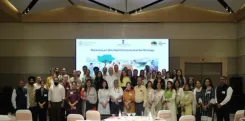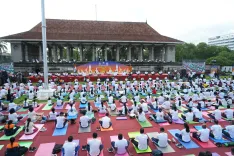What is the new Rs 2.3 crore startup challenge for renewable energy innovation?

Synopsis
Key Takeaways
- Innovative Challenge: The government launched a Start-Up Challenge with a total prize pool of Rs 2.3 crore.
- Application Deadline: Applications are due by August 20.
- Support for Winners: Mentorship and incubation support will be provided.
- Focus Areas: Categories include affordability, resilience, inclusivity, and sustainability.
- Inviting Startups: The challenge is open to various sectors including green tech and fintech.
New Delhi, June 21 (NationPress) The Indian government has introduced a groundbreaking ‘Start-Up Challenge’ with a total prize pool of Rs 2.3 crore aimed at promoting innovations in rooftop solar and distributed renewable energy.
Innovators will vie for the Rs 2.3 crore prize, which includes Rs 1 crore for the top winner, Rs 50 lakh for the second place, Rs 30 lakh for third place, and 10 consolation prizes of Rs 5 lakh each.
The deadline for applications is August 20, with results to be announced on September 10.
Winners will also receive incubation support, pilot implementation opportunities, and mentorship from industry experts and investors, facilitated by the Ministry of New and Renewable Energy (MNRE) and the National Institute of Solar Energy (NISE), as stated by the ministry.
This national innovation challenge is designed to identify and support transformative solutions for India's rooftop solar and distributed energy landscape.
Implemented under the MNRE's guidance and in collaboration with StartUp India and the Department for Promotion of Industry and Internal Trade (DPIIT), the Start-Up Challenge invites applications from innovators and startups across India, focusing on four pivotal categories to enhance renewable energy adoption.
The categories include affordability—making rooftop solar accessible for low- and middle-income households through innovative financing, modular systems, and circular economy strategies.
Resilience aims to bolster climate resilience, grid stability, and cybersecurity in solar infrastructure, particularly for vulnerable and remote regions.
Inclusivity focuses on increasing access for underserved communities through community solar projects, virtual net metering, and inclusive financing models. The final category is environmental sustainability, which encourages eco-friendly technologies such as solar panel recycling, land-neutral solar projects, and hybrid clean energy solutions.
The challenge invites a diverse array of startups in green technology, IoT, AI, blockchain, construction, energy hardware, fintech, and waste management.







